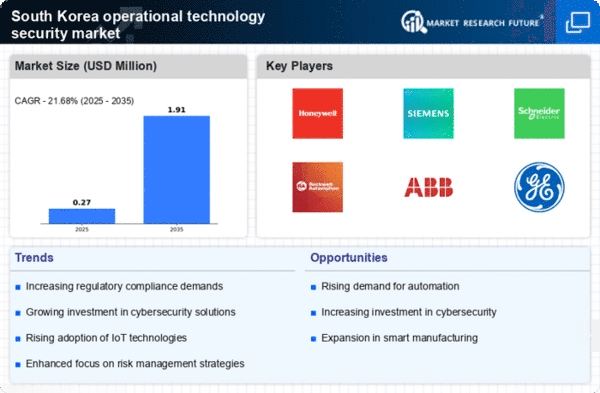Rising Cyber Threats
The operational technology-security market is experiencing heightened demand due to the increasing frequency and sophistication of cyber threats. In South Korea, industries such as manufacturing and energy are particularly vulnerable, with reports indicating a 30% rise in cyber incidents over the past year. This alarming trend compels organizations to invest in robust security measures to protect critical infrastructure. As a result, the operational technology-security market is projected to grow significantly, with estimates suggesting a compound annual growth rate (CAGR) of 12% through 2027. Companies are prioritizing the implementation of advanced security protocols and technologies to mitigate risks, thereby driving market expansion.
Government Initiatives and Support
The operational technology-security market is bolstered by proactive government initiatives aimed at enhancing national cybersecurity. The South Korean government has launched various programs to promote the adoption of security technologies across critical sectors. For instance, the Ministry of Science and ICT has allocated approximately $200 million to support cybersecurity research and development. Such investments not only foster innovation but also encourage collaboration between public and private sectors. This strategic focus on cybersecurity is expected to stimulate growth in the operational technology-security market, as organizations align with government standards and frameworks to safeguard their operations.
Increased Automation and IoT Adoption
The operational technology-security market is significantly influenced by the rapid adoption of automation and Internet of Things (IoT) technologies. As South Korean industries increasingly integrate IoT devices into their operations, the potential attack surface expands, necessitating enhanced security measures. Reports indicate that over 70% of manufacturers in South Korea are implementing IoT solutions, which raises concerns about data integrity and system vulnerabilities. Consequently, the operational technology-security market is likely to see a surge in demand for solutions that can effectively secure these interconnected systems. This trend underscores the need for comprehensive security strategies that address the unique challenges posed by automation and IoT.
Growing Awareness of Cybersecurity Risks
The operational technology-security market is benefiting from a growing awareness of cybersecurity risks among organizations in South Korea. As high-profile cyberattacks make headlines, businesses are increasingly recognizing the importance of safeguarding their operational technology environments. Surveys indicate that nearly 65% of companies now prioritize cybersecurity in their strategic planning. This shift in mindset is driving investments in security solutions, as organizations seek to protect their assets and maintain operational continuity. The operational technology-security market is thus positioned for growth, as companies allocate resources to enhance their security postures and mitigate potential threats.
Emergence of Advanced Security Technologies
The operational technology-security market is witnessing a surge in the development and adoption of advanced security technologies. Innovations such as blockchain, artificial intelligence, and machine learning are being integrated into security solutions to enhance threat detection and response capabilities. In South Korea, the market for AI-driven security solutions is expected to reach $1 billion by 2026, reflecting a growing trend towards leveraging technology for improved security outcomes. This evolution in security technology not only addresses current vulnerabilities but also prepares organizations for future challenges. As a result, the operational technology-security market is likely to expand as companies invest in cutting-edge solutions to stay ahead of emerging threats.
















